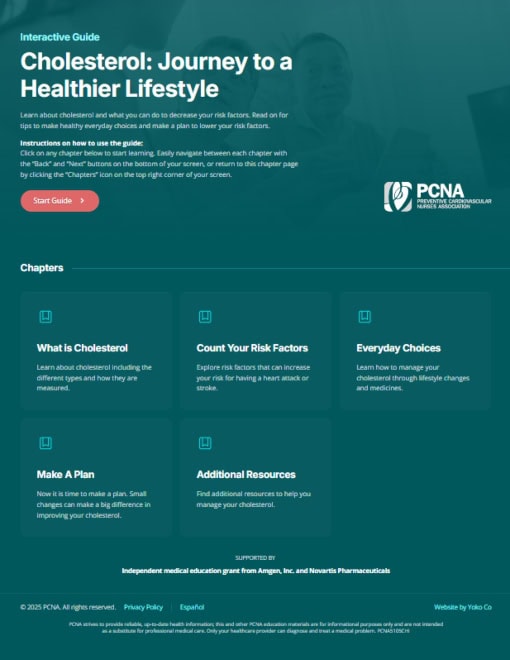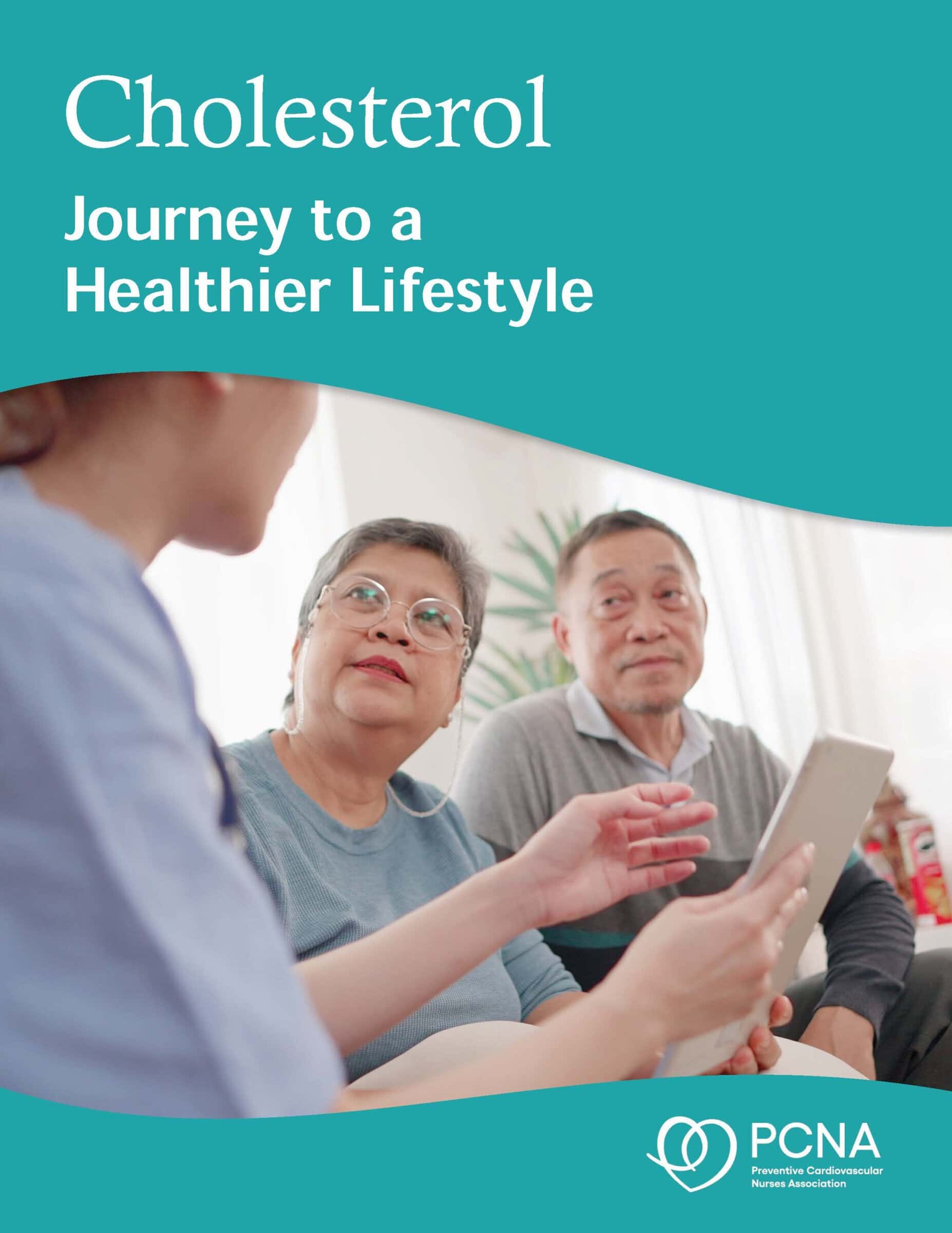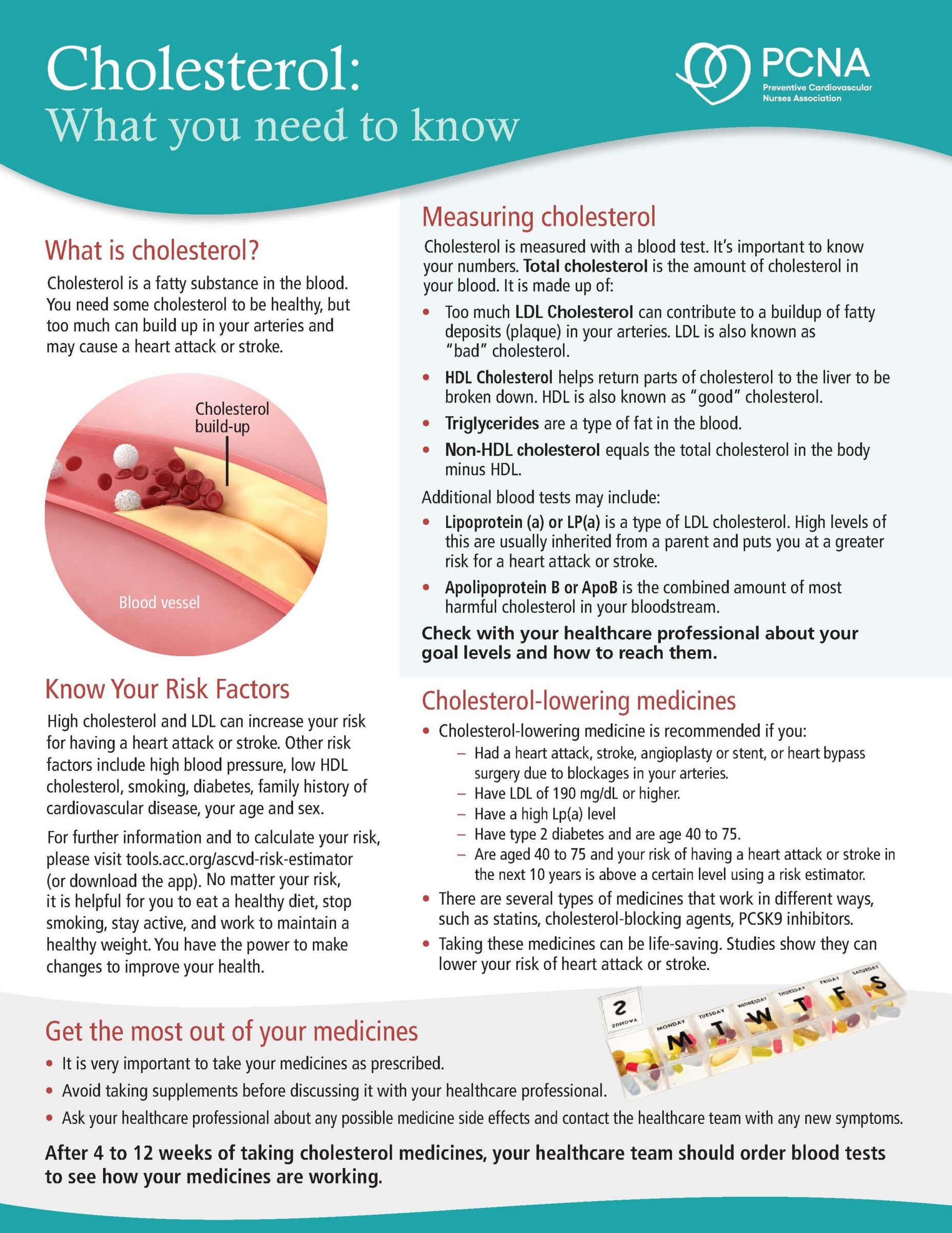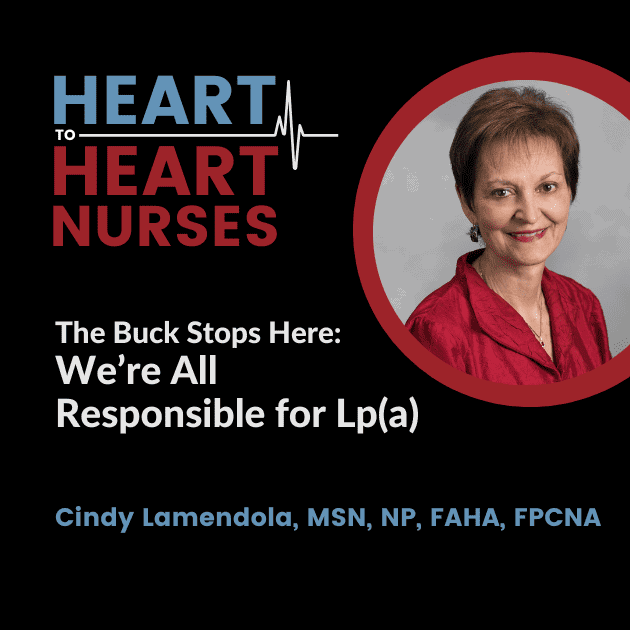Guest Cindy Lamendola, MSN, NP, FAHA, FPCNA, describes the impacts of elevated Lp(a) on the body. Current clinical trials and the necessity of including diverse participants are described, as well as the importance of keeping Lp(a) front of mind no matter our role as healthcare professionals.
Earn 0.25 CE contact hours from listening to the podcast episode and completing the course components.
Episode Resources
- Lipoprotein(a) and its Significance in Cardiovascular Disease: A Review: Duarte Lau F, et al. JAMA Cardiol. 2022. PMID: 35583875 Review
- Lipoprotein(a) and LDL-C: The Relevance of Equivalence: Journal of the American College of Cardiology [0735-1097] Morris yr:2022 vol:80 iss:21 pg:2011 -2013
- Equivalent Impact of Elevated Lp(a) and FH in Patients with ASCVD
Welcome to Heart to Heart Nurses, brought to you by the Preventive Cardiovascular Nurses Association. PCNA’s mission is to promote nurses as leaders in cardiovascular disease prevention and management.
Geralyn Warfield (host): Welcome to the third of a three-episode miniseries focused on lipoprotein (a). To expand your knowledge about this topic, we suggest you also listen to our first episode on prevalence and testing, as well as our second episode on guideline-directed medical therapy.
This particular episode is available for CE contact hours. Please be sure to follow the link in the episode show notes to complete the post-test and to access your CE certificate.
My guest today is Cindy Lamendola. Cindy, could you introduce yourself?
Cindy Lamendola (guest): Yes, Geralyn. Hello, everyone. And I am Cindy Lamendola, an Adult Nurse Practitioner.
I work at Stanford Medicine in [00:01:00] Cardiovascular Medicine in research, and I work in Stanford Healthcare in clinical practice with the Stanford Center for Inherited Cardiovascular Disease with a focus on patients with lipid abnormalities, including elevated lipoprotein (a). And I meant to say in research I work on lipid disorders as well as in insulin resistance and diabetes.
I am very pleased to be part of PCNA and this great team to present more information on Lp(a). It’s a very important topic to be aware of. And to keep up to date on new possible therapies.
Geralyn Warfield (host): Cindy, just in case any of our audience members missed either of the first two episodes in this mini-series, could you tell us why we should care about Lp(a)?
Cindy Lamendola (guest): Thank you for that great question, Geralyn, because I think people don’t realize that about 20 to 30% of the population at large is affected with [00:02:00] elevated lipoprotein (a). And that puts them at—independently of LDL cholesterol—and that puts them at risk for atherosclerotic cardiovascular disease.
Now what does that mean? That means coronary artery disease, stroke, peripheral arterial disease. And something that people also forget is calcific aortic valve stenosis, which is, this is a very important risk factor for that.
And I think Kathy had mentioned previously that the global prevalence is estimated at 1.4 billion individuals.
And again, patients can have high lipoprotein (a) without having an elevated LDL cholesterol, so you may totally miss it; so, miss their risk for cardiovascular disease. So again, we’re, we are not recognizing this and it is a very important risk factor.
Kathy and Lisa covered in the first episode of this [00:03:00] three-part mini-series, the types of individuals we should consider having tested.
And a reminder that this is a simple blood test that you need to order as it’s not part of our regular lipid panel. Again, elevated lipoprotein (a) can lead to an increased risk for stroke and cardiovascular disease and aortic stenosis. So, it is very important for us as clinicians to be aware of who might be of greatest risk.
Geralyn Warfield (host): One of the great aspects of clinical practice that you bring to our, our podcast episode today is really the focus on research. And research always plays an important role in helping us understand the mechanisms and pathophysiology of any disease. But in this case, we’re talking about Lp(a). And Cindy, would you please discuss for us how diversity in clinical trials helps to support improved patient outcomes?
Cindy Lamendola (guest): Geralyn, another great question. [00:04:00] We know that to determine if potential treatments will be effective, we have to study all populations. And so, one of the things that maybe people don’t realize is that with Lp(a)—it’s more prevalent in the Black population and the South Asian population, and then the white, Hispanic and East Asian populations.
So, if we are not studying these populations, how will we know if we have treatments, if they’re going to be effective in these populations, and will it be different in how they affect these populations and the possible side effects? And so, I urge people, and I think we now know that this is a kind of a mandate, that we increase our diversity when we are doing research studies, that we make a big effort to really reach out to the different populations as well as ages of people and sex, so that we get the important [00:05:00] information we need when we’re doing these very important studies.
We’ll not only gain the knowledge of the treatments if they’re effective in everyone, but again, will there be differences in how they respond to the treatments, as well as potential side effects.
Geralyn Warfield (host): We’ve been talking with Cindy Lamendola about Lp(a) and clinical trial diversity. We are going to take a quick break and we will be right back.
Geralyn Warfield (host): We’re back talking with Cindy Lamendola about Lp(a). And I’m going to shift gears just a little bit and talk a little bit about team-based care. Cindy, particularly in these patients with Lp(a), could you please discuss for us strategies to ensure that Lp(a) testing and treatment are front of mind for all of us who are clinicians, no matter our practice setting?
You’ve discussed already the importance of all of us being aware because of that high prevalence, which affects more of our patients than we perhaps realize. So, what can we do in clinical [00:06:00] practice about that?
Cindy Lamendola (guest): It’s interesting, Geralyn, that even though we have been aware of lipoprotein (a) for about 60 years, it really is only recently coming to our attention of what an important individual risk factor it is in increasing people’s risk for cardiovascular disease and calcific aortic stenosis.
It’s just not, up front and center in our caring for patients who may be at additional risk with elevated lipoprotein (a) and elevated LDL cholesterol, or just elevated lipoprotein (a) and having premature disease when we can’t figure out why the patient has premature cardiovascular disease.
I know that Lisa did a great job in reviewing who we would consider at possible risk for having elevated lipoprotein (a), and to test those individuals as part of our ASCVD risk assessment.
As a quick review, [00:07:00] we know people who already have cardiovascular disease would be a population we would study. We know that there’s a strong, increased risk for elevated lipoprotein (a) in the patient population with familial hypercholesterolemia. And then again, as I mentioned, in family history of premature cardiovascular disease or a known first-degree relative with elevated lipoprotein (a) for sure.
And again, there are people that we see in our clinic, and they have premature disease, but their risk factors are not that abnormal. And we are scratching our heads, kind of figuring out, “Well, why does this person have cardiovascular disease?” Or, “Why do they have aortic stenosis?” And now we, we know that it, it can also be related to elevated lipoprotein (a).
And just quickly, there, it’s more than just being pro atherogenic. It is pro-inflammatory [00:08:00] and probably prothrombotic, so it has different mechanisms of reasons why it can increase our risk for cardiovascular disease and aortic stenosis.
Now you ask how we can bring this to attention. Well, right now I think we’re in a little flux. There’s a lot of research out there. The American Heart Association/ACC guidelines mention lipoprotein (a) certainly as a risk enhancer, but we don’t have guidelines yet to say, “Test these specific populations,” or, “Let’s do universal screening on everybody.” Not here in the United States.
There are other countries—Europe has guidelines, Canada has guidelines. The UK has guidelines. But they actually are not all the same either. Some say only test certain individuals that we think may be at risk, and some say do universal screening.
So, there’s some inconsistencies also in do [00:09:00] we measure in mg/dL or do we measure in nmol? What do we consider elevated?
And so we’re waiting for those guidelines, but we don’t need to wait.
I think we do know, at least right now, who the people are that are potential [at] risk for elevated lipoprotein (a). And if we don’t do anything, we can certainly start screening those people. And their families once we find out if they have, elevated lipoprotein (a).
I think we’re going to hear a lot more about screening and I think sooner than later, it will also be, become part of our guidelines and then become recommendations from other groups besides just the, the main AHA/ACC and other important groups. But I think individual practices will start doing it and eventually you will see more and more people being tested. [00:10:00]
One caveat is that for some individuals, the insurance companies, because it isn’t in specific guidelines, may not pay for it. So, we want to make sure that they will pay for it, be before, we test our patients. I’ve only had rare experiences with that, but I, but I have had other people say that.
Geralyn Warfield (host): Cindy, there’s also, when it comes to research, research into medications that might treat Lp(a), could you talk about that a little bit for our audience?
Cindy Lamendola (guest): Well, that’s a very exciting topic right now, because—Kathy also did a great job in reviewing the medications we used in the past, which we really don’t use anymore, or the things we knew that estrogen lowered Lp(a) but we certainly weren’t giving people estrogen to lower Lp(a). And we don’t use niacin anymore because we don’t find that efficacious.
So, for a while we were kind of in flux, like what can we do to help lower [00:11:00] Lp(a)? And I know Kathy mentioned some of the PCSK9s do lower Lp(a), but really, we need to have quite a significant lowering—at least that’s the thought—to make a difference in terms of decreasing cardiovascular events.
So, in full disclosure, I am involved in one of the research studies for a medication to lower Lp(a), but there are four ongoing studies right now.
One of them is an antisense oligonucleotide. And the others are a small interfering RNA. That’s, that’s how they work. They are injectable medications at this time.
And the first medication lowers Lp(a) by about 80% and is given once a month. And the others can lower Lp(a) close to up to [00:12:00] 98%. So, and those don’t, will not have to be taken every month. So, this is a very exciting time. The first trial, and this is the one I’ve been involved with, a Phase II and now Phase III, is now looking at outcomes, which is, the, we know it works, we know where it lowers Lp(a). But what we need to find out is if lowering Lp(a) will indeed decrease cardiovascular, cardiovascular disease and events.
This particular trial, all the patients have elevated lipoprotein (a) as well as cardiovascular disease. And there will be a trial—I’m not sure when that will start—that will be looking at giving the medication to lower the incidence for people with aortic stenosis, and see if it either slows the process or stops the process of the aortic [00:13:00] stenosis increasing.
So, I think for those individuals who have elevated lipoprotein (a) currently, a thought is we are just going to lower their LDL as much as possible to decrease their risk.
Now, in the near future, maybe in the next four to five years, there actually will be medications that we know work. And we’ll know about their side effects, and we’ll know how all populations tolerate them and if it’s beneficial in all populations.
But I think two things Geralyn, I’d like to just wrap up with, with which, what you have said, or maybe three things, is:
- a) it’s important that we keep this upfront in our minds when we’re assessing cardiovascular risk in all of our patients.
b). When we’re doing research, we really need to increase our diversity in our research patients.
- c) And three, we can be hopeful to our patients to let them know that in the, the fairly near future, we will probably have a great treatment to lower Lp(a) and lower people’s risk for cardiovascular disease.
Geralyn Warfield (host): Cindy, that gives us great hope though, for those of us that have patients with Lp(a) that’s elevated, which you described early in our conversation, is pretty much all of us, whether or not we know it or not. So that is very exciting and [00:15:00] provides a lot of things for us to look forward to. And we appreciate you and all the other researchers and all the other patients that are involved in these projects in getting more information, so we have novel therapies that we can offer to our patients in the future.
Cindy, it has been a delight spending time with you today. We’d like to thank you for sharing your take on Lp(a), both current and future treatments.
We’d also like to thank Novartis Pharmaceuticals Corporation for their grant funding for this particular podcast episode.
As I said earlier, this episode is available for CE contact hours. Make sure that you follow the link in the episode show notes. That’s where you’re also going to find those resources that Cindy mentioned, but then you will be able to complete your post-test and access your CE certificate.
This is your host, Geralyn Warfield, and we will see you next time.
Thank you for listening to Heart to Heart Nurses. We invite you to visit pcna.net for clinical resources, continuing education, and much more.
Topics
- Lipid Management
Published on
September 5, 2023
Listen on:

MSN, NP, FAHA, FPCNA
Related Resources

Online Interactive Guides
Cholesterol: Journey to a Healthier Lifestyle Online Interactive Patient Guide
February 12, 2025









